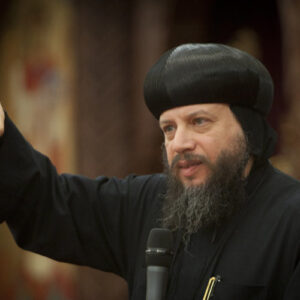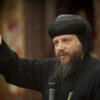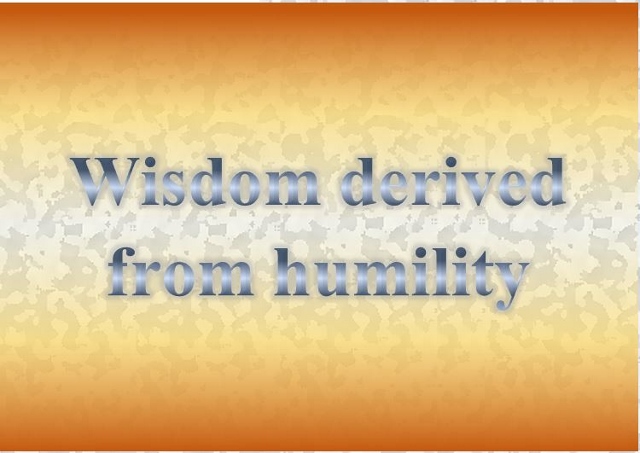St. Anthony's humility took many forms. St. Anthony listened to others without insisting on his own opinion from his childhood. As an adult, St. Anthony committed himself to solitude and practiced it by living enclosed for twenty years during which he did not see a single human face. This, it is thought, is the life …
St. Anthony’s humility took many forms. St. Anthony listened to others without insisting on his own opinion from his childhood. As an adult, St. Anthony committed himself to solitude and practiced it by living enclosed for twenty years during which he did not see a single human face. This, it is thought, is the life he preferred. Yet, following many years in the desert, when people gathered at his door, asking to see him or hear his teachings, he did not turn them away even though he wanted to remain in the life of complete solitude which he had chosen for himself.
He instinctively knew he must change his preferred way of life and begin to teach monasticism, opening his door to all that wanted to visit. He thus changed his life style for the sake of others and with wisdom accepted what God wanted him to do. St. Anthony believed monasticism entailed abandoning the world and living in the desert in prayer and meditation. However, when bishops called upon him to go to Alexandria to fight Aranism, he went to the city and stayed with the people for three days until his mission was accomplished. Only then did he return to his solitude. He was obedient and did as he was told although he was about one hundred years of age at the time.
Another act of humility encompassed visiting the martyrs awaiting trial and torture. He gave them his support and encouraged them.
Further, by St. Anthony’s humility he overcame stringency and stubbornness that could be associated with isolation. His modesty would create in him gentleness. He became happy and joyful in his humility and kept it a central part of his life until its end.
During the time of St. Anthony, the Egyptians were in the habit of taking the dead bodies of righteous men and especially those of the blessed martyrs and of preserving them, and placing them not in graves but on biers in their houses for they thought that by doing so this was doing them honor. St. Anthony, upon becoming sick, specifically and humbly told the two disciples who had been with him the last fifteen years to dig a grave for him in the earth upon his death and to tell no one where they laid him and there I shall be until the Resurrection of the dead. Humility, even unto death, was St. Anthony’s last wish, following the example of the deaths and ground burials of the holy Apostles.
St. Anthony further gave instructions for his meager possessions. “Divide my garments into lots and give one leather tunic to Bishop Athanasius and the covering of this my bed which he gave to me when it was new; but now it has the age of many years. And to Bishop Serapion do ye give the other leather coat; and this covering of my bed which is made of hair you yourselves shall keep.” He instructed his disciples to abide in the peace of the Lord Jesus Christ, and his face became full of joy unspeakable. With heavenly joy upon his face, St. Anthony departed this world. The disciples wrapped the garment which he wore around him, dug an unmarked hole in the earth, and buried his body without ceremony and no man knows where they buried him except the two who laid him in the earth to this very day.
Many youth have often asked why St. Anthony did not become a bishop yet he was a contemporary of bishops. During the day of St. Anthony many did indeed assert that the bishops should be chosen from the monks. However, during St. Anthony’s time, monasticism was regarded as a spiritual order and above the realm of pastoral care. It was considered a better life than priesthood and a life closer to that of the angels. It was thought, who would quit monasticism to become a bishop.
Ephram El-Souriany said, “Inside the meek and humble man, the spirit of wisdom rests.” This is such an astounding quote. When put in perspective regarding the life of St. Anthony, as we know that he had no guide. He had little childhood formal education. There were no books he could research and self educate himself in the desert to gain knowledge from. He was alone throughout most of his spiritual quest without companions but did not fall once. He had complete faith in God, the longevity of his life from childhood until death believing that God would be with him. He obtained his strength from deep within himself and had the courage to enter into the uncharted unknown in the search of angelic worship. His humility conceived his wisdom.
Today, we commemorate St. Anthony the Great not only on his feast but also in the commemoration of the saints in our Divine Liturgy and in the Midnight Prayers.
(From: H.G. Bishop Youssef’s speech given during H.H. Pope Shenouda III’s visit to St. Antony Coptic Orthodox Church.)
Join Us: Sign Up Today!
Tags:












